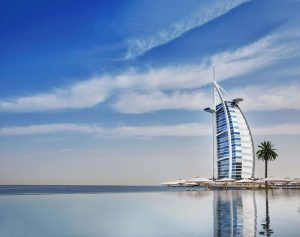
#OutToLunch Dubai visas: Time for Africa to develop its ports, free trade zones and resorts
#OutToLunch Dubai visas: Time for Africa to develop its ports, free trade zones and resorts By Denis Jjuuko The emirate of Dubai has been one of the favorite destinations for Ugandans. About five hours away by air, Dubai glitters with its skyscraper spikes that pierce the clouds. The shopping malls, the desert safaris, dinners on dhow cruises, the pilotless trains, multiple lane freeways and spaghetti intersections, affordable 5-star hotels and serviced apartments, Dubai is always on people’s radars. For decades, Ugandan traders have been frequenting Dubai to source for their wares. From used cars and automotive parts, garments and jewelry to smart phones. Whether at a café in the airport or somewhere in the shopping malls, if you were keen you would find a youthful Ugandan earning a living in the city, on a business trip or eating life with a big spoon! Dubai is a world class city that has been on bucket list for many Ugandans. Honeymoons, festive season holidays, anniversaries, or just to chill out in the ocean while taking selfies with dhow shaped 7-star hotels providing the backdrop, Dubai was an ultimate visit for many. A few Ugandans have even invested in real estate in the city. But what made Dubai really endearing for most Ugandans was how easy it was for people to acquire visas. It was one of the few mega cities where a visa is required but where one didn’t have to donate half their salaries to pastors to pray for them so they could get it. Agents easily arranged tourist or business visas, making Dubai accessible for anyone with a few shillings to their name. That has however changed. Dubai says 20 countries including Uganda will no longer have access to these easy to get 30-day visas. One would have now to pray to get a visa. As I write this, some notable businesspeople I know were denied visas or didn’t get them in time for their trips. Apparently, some youthful Ugandans have been abusing the visa—going as tourists and overstaying their visas trying to eke a living in the lit city. Those who the authorities have been able to catch have been detained awaiting deportation. Many claim they have no money to pay for air tickets. The politicians quickly saw an opportunity and became benevolent helping some to return home. With access to Dubai becoming increasingly difficult, some businesses will suffer. Many tour agents have been surviving on tours to Dubai and as the festive season approaches, it is going to be tough for them. Many people had even booked trips already and paid. The agents would now have to refund if they fail to secure visas. Companies like Uganda Airlines will be hit as well. Some goods that have been always imported from Dubai or even from nearing emirates like Sharjah will now become scarce. Your car spare parts will most likely become expensive. If you have been looking for a gomesi, the prices may double and so many other such products. Those who have been exporting matooke and all such produce may see a dip in their pockets. It is already a tough economy for Uganda this year. Lack of access to Dubai will make things worse. Since almost half of the countries on the continent have been affected, it is time for the African Union to show what it is made of. Using the power of collective bargaining, they can talk to the rulers of Dubai for a way out. It isn’t Africa that has been only benefitting from easy access to Dubai. The Emirates Airlines, perhaps Dubai’s most important asset has daily or weekly flights to almost all international airports on the continent. It may not be its most lucrative route, but one it can’t live without. We are a continent of 1.4 billion people, same population as China and several times bigger than the USA. We have more natural resources than some of these very big economies. That is why the African Union should come in and work out a deal that is suitable for all parties. However, this is also a wake-up call for Africans to develop the continent and stop relying on outsiders for every little thing. It is time to develop our ports and create free trade zones that can attract investment. We must stop fighting each other for every little thing and ensure that there is rule of law which is key in attracting foreign direct investment or FDI. We can trade with each other. We have better weather than Dubai so we can build the resorts. We just need to focus. For the traders, may be it is time to invest in factories here than relying on only importing finished articles. The writer is a communication and visibility consultant. djjuuko@gmail.com


